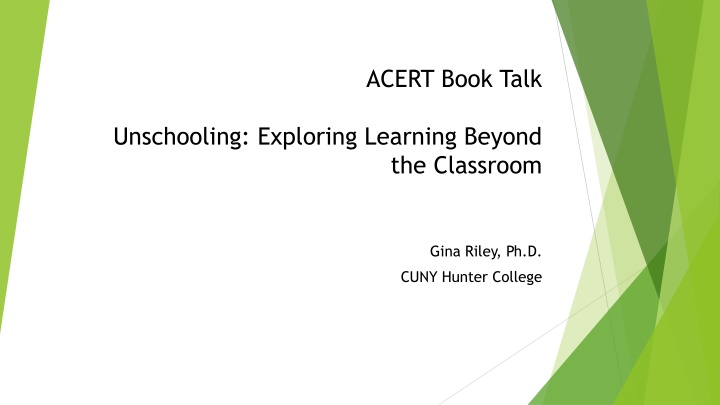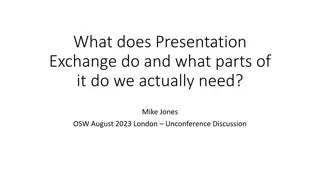
Exploring Unschooling: Learning Beyond the Classroom
Discover the rise of unschooling as an educational alternative, the difference between homeschooling and unschooling, historical perspectives, and theoretical frameworks, shedding light on a growing trend in home-based education.
Download Presentation

Please find below an Image/Link to download the presentation.
The content on the website is provided AS IS for your information and personal use only. It may not be sold, licensed, or shared on other websites without obtaining consent from the author. If you encounter any issues during the download, it is possible that the publisher has removed the file from their server.
You are allowed to download the files provided on this website for personal or commercial use, subject to the condition that they are used lawfully. All files are the property of their respective owners.
The content on the website is provided AS IS for your information and personal use only. It may not be sold, licensed, or shared on other websites without obtaining consent from the author.
E N D
Presentation Transcript
ACERT Book Talk Unschooling: Exploring Learning Beyond the Classroom Gina Riley, Ph.D. CUNY Hunter College
Weve come a long way Interest in home learning has doubled during the pandemic. 10% of American families are choosing to homeschool this year, up from 5% one year ago (Gallup, 2020). This percentage does not count the number of families schooling from home or remote schooling with curriculum coming from the district, or home learning within a pandemic pod. Interest is increasing day by day, as the National Home School Association reports receiving 3400 calls per day, as opposed to the 5 or 10 they generally get about homeschooling. Of course, we will see whether this number changes after the pandemic, but one thing is clear: More families are pursuing educational alternatives than ever before. Unschooling as a choice, just like public, private, or homeschooling.
Difference between Homeschooling and Unschooling Unschooling is often considered to be a branch of homeschooling. While other homeschoolers may do school at home and follow a set curriculum, unschoolers learn primarily through everyday life experiences - experiences that they choose and that therefore automatically match their abilities, interests, and learning styles (Wheatley, 2009). In unschooling, there are no grades or tests. Assessment is authentic and intrinsic. Approximately 20 % of homeschoolers consider themselves unschoolers, and that number is growing every day. Most unschoolers start off as traditional homeschoolers, then loosen curriculum expectations as they see how much their child is learning and growing on their own.
Historical Perspectives Hunter-Gatherer Cultures - learning through cultural transmission Rousseau (1712 1788) learning from the natural world, education as natural, simple and unstructured John Dewey (1859 1952) focus on having individuals be socially engaged, democratic citizens I believe that education, therefore, is a process of living, and not preparation for future living A.S. Neill (1883 1973) Summerhill, boarding school focused on freedom and autonomy for all students. Ivan Illich (1926 2002) Deschooling Society - critique of compulsory education John Holt (1923 1985) How Children Fail (1964), How Children Learn (1967) Father of Unschooling John Taylor Gatto (1935 2018) Dumbing Us Down (1992) and The Underground History of American Education (2001) Peter Gray (1946 present) Free to Learn (2013)
Theoretical Perspectives Self Determination Theory/Cognitive Evaluation Theory (Deci & Ryan, 1985) **Focus on Intrinsic Motivation and the facilitation of competence, autonomy, and relatedness. Gardner (1991) Theory of Multiple Intelligences
Growth of Unschooling Demographics: Once the realm of liberal white two parent families, the face of unschooling has changed dramatically. Increase especially in Black and Hispanic families (due to schools not meeting the needs of their children, as well as the predominantly Eurocentric curriculum taught in most schools) Increase in students of lower SES unschooling Increase in students with special needs unschooling Increase in students who identify as LGBTQ unschooling
Paths to Unschooling Most individuals come to unschooling after a period of homeschooling (and previously, public or private schooling) Concept of Deschooling (especially on the part of the parent or guardian) Natural family living, books, conferences, speakers, TED talks As a result of knowing other unschooling families
Subject Based Learning and Criticisms A major criticism of unschooling comes from the notion that unschooled students will have gaps in their education as a result of not having a well rounded, curriculum based education . ***Just as schooled students have gaps in learning, unschooled students will too. In my teens I used to worry that I had gaps when compared to schooled peers, but the older I got the more apparent it became just how different everyone s skills were. I realized that I was better at some things than some people, and other people were better at other things. I knew more about some subjects, and less about others, just like all of my friends, whether schooled, homeschooled, or unschooled (Desmaris, 2020) ***One of the most widely known benefit of unschooling: Individuals learn HOW to learn, and live a life of learning that is completely generalizable (Riley & Gray, 2013)
Challenges of Unschooling (Gray & Riley, 2013) Gray and Riley s (2013) study was the first large scale, international study of 232 unschooling families. Reviewed demographic data on unschooling, reasons for unschooling, and the benefits and challenges of unschooling. 43.5% respondents: feeling of social stigma and pressure based on the choice to unschool 42% getting rid of culturally ingrained thoughts re: the nature of teaching and learning Time, career, and income effects Legal issues surrounding unschooling
Benefits of Unschooling (Gray & Riley, 2013) 57.3% - Increased Student Learning 52% - Social Emotional Benefits 57% mentioned an increase in Positive Family Relationships 36% reported Family and Individual Freedom of Schedule
Adult Unschooler Outcomes (Gray & Riley, 2015; Riley & Gray, 2015) 69% reported a good social life (specifically mentioned age mixing benefits and positive social interactions) 77% Time to pursue one s interests 75% Freedom and independence 75% Increased self direction and intrinsic motivation** Also: Increased learning, smoother transition to adulthood 37% reported no disadvantages 3 out of 75 reported more negative experiences (in all cases, parent had mental health issues 2/3 saw benefits in the unschooling experience overall)
Adult Outcomes Continued 83% of respondents pursued higher education **Different paths to college acceptance All respondents were employed (except for those who were full time students or caregivers for young children) 78% completely financially independent
From one unschooler. The biggest advantage of unschooling was that it smoothed the transition to adulthood instead of all of a sudden being thrown out into the real world of college or career at age 18. I was able to begin exploring these things at a young age and at my own pace. At 15 I was able to take a college class, because I was interested, and see what college was like. At 16 I was able to start working a part time job, and slowly work more and more. I was able to enroll full time in college in what would have been my senior year of high school. I didn t have to wait unschooling gave me the immediate benefit of time and space to explore my interests and ask myself questions such as What kind of person am I? and Who do I want to be? , and then work to make those the same (Gray & Riley, 2015).
Branches of Unschooling Worldschooling Outdoor schooling** Unschooling Co-Ops and Self Directed Learning Centers (North Star in Massachusetts, Princeton Cooperative in New Jersey, Natural Creativity Center in Pennsylvania, Liberated Learners all across the United States)
Public and Private School Extensions National Opt Out Movement Democratic or Sudbury Schooling Monument Mountain Regional High School David Lane: One Period a Day High Tech High School
University as Unschooling** Independent study and independent projects Generalizable Curriculum Qualitatively assessed projects Self-directed, Socratic Seminars Choose your own adventure assignments Civic and Community Engagement (even remotely!) Internships/Apprenticeships Spending days doing what we love
Q & A Giveaway!
Contact and References References and Articles upon request griley@hunter.cuny.edu






















